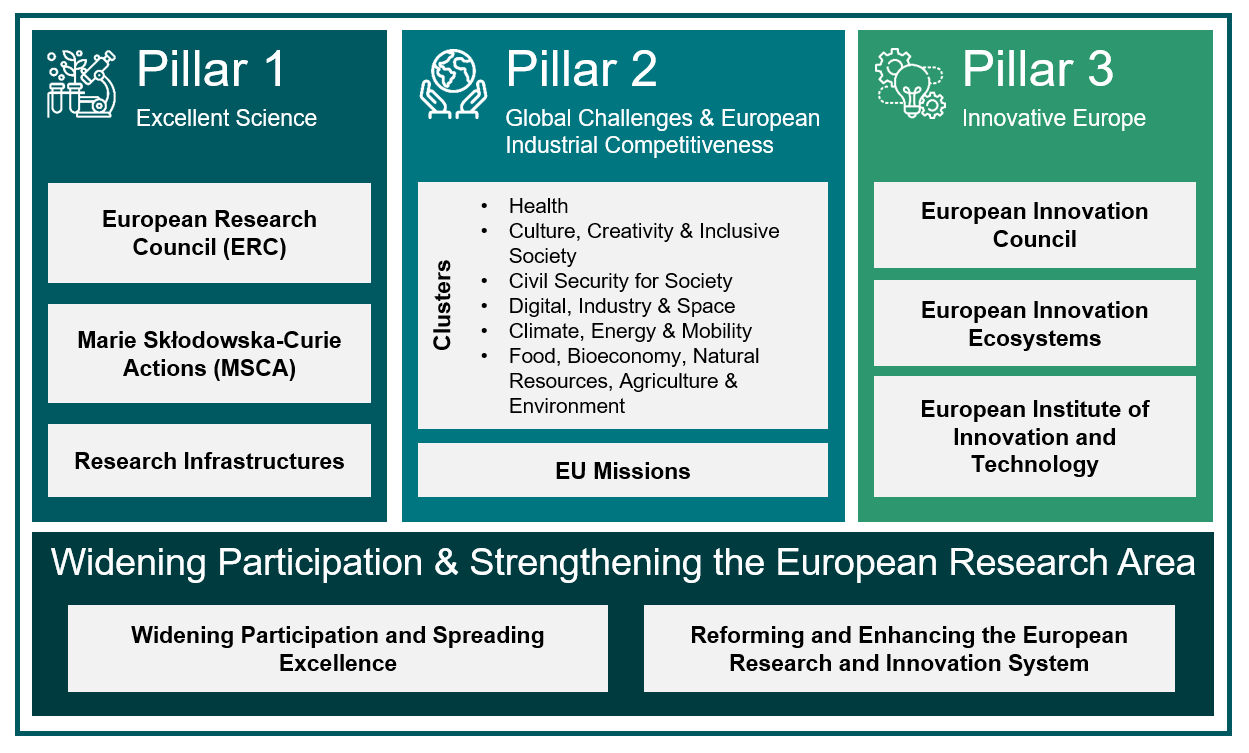Contact
fiona.reid@slu.se, +46 18 67 3242, +46 72 2288689
Horizon Europe is the EU’s ninth Research and Innovation Programme, running from 2021 to 2027.

Horizon Europe is organised into three pillars - 1) Excellent Science, 2) Global Challenges and European Industrial Competitiveness, and 3) Innovative Europe. There is also a fourth component, on widening participation and strengthening the European Research Area, which cuts across the entire programme.
Each area of Horizon Europe publishes annual or bi-annual work programmes listing all upcoming calls. The SLU Grants Office usually receives drafts of future work programmes (only accessible to SLU staff), and there may be opportunities for you to provide comments. If you would be interested in doing so, please contact the Grants Office (grantsoffice@slu.se).
Pillar I supports frontier research and breakthrough scientific ideas, teams up the best researchers from Europe and beyond, and equips them with skills and world-class research infrastructures.
Pillar II encourages cross-disciplinary, cross-sectoral, cross-policy and cross-border collaboration in pursuit of the Sustainable Development Goals by following the principles of the UN’s 2030 Agenda for Sustainable Development, the Paris Agreement on Climate Change, and the competitiveness of the EU’s industries.
The areas within Pillar II are:
Pillar III supports the development of disruptive and market-creating innovations and enhances European innovation ecosystems.
Horizon Europe projects are always associated with some level of co-funding for direct costs, indirect costs, or both. Each programme has specific rules for funding rates and cost eligibility – you can find an overview in the General Annexes to the Horizon Europe work programme.
At present, some areas of Horizon Europe are prioritised by SLU and are therefore eligible to apply for central co-funding when SLU is the coordinator. Other projects may be eligible for three-part co-funding (department + faculty + central).
Co-funding priorities are reviewed annually, so please make sure to check the latest list of prioritised grants, eligibility criteria, and application processes in SLU’s co-funding guidelines.
All Horizon Europe calls are announced on the European Commission’s Funding & Tenders Portal, and this is also where you create and submit your application. You will always be asked to provide SLU’s Participant Identification Code (PIC) - our PIC is 999887350.
Via the F&T Portal, you can download many reference documents, including a comprehensive Horizon Europe Programme Guide, copies of the latest work programmes, and standard templates. Once you register a draft application in the F&T Portal, you will be able to download an editable version of the proposal template, which may include amendments specific to the call – make sure always to use this version.
Horizon Europe applications consist of an online form and one or more proposal parts, which you upload as pdfs. If there are several partners in your project, each organisation must fill in part of the online form with administrative information. The coordinator or lead applicant must add other information to the online form, for example, an abstract, ethics declarations and budgetary data. They must also upload all proposal parts and submit the application.
There are strict deadlines for Horizon Europe applications indicated in each call. The submission system in the F&T Portal will close at the deadline (usually at 17:00 CET), and late submissions are not accepted. Make sure to submit your application in good time – the F&T Portal can become busy and slow in the hours before the deadline, so a last-minute submission is risky. You can submit and re-submit your application as many times as you want before the deadline, so it is a good idea to submit a version you are happy with a week early and then re-submit as you refine and make final edits.
If you are interested in applying, the Grants Office can answer your questions and, in some cases, offer one-to-one support:
The European Commission offers a lot of guidance to help you understand their funding programmes and prepare your application:
SLU's legal affairs unit is responsible for providing support in legal and contractual matters; you can contact them via juridik@slu.se.
You will report your project expenses and results to the European Commission via their Funding & Tenders Portal.
At SLU, it is usually the department's responsibility to provide support during the implementation and administration of projects, including handling financial issues. Each department has a dedicated person with the administrative role 'project finance', with the main task of supporting the implementation and reporting of research projects.
The university administration's support for project accounting and financial reporting to funding bodies primarily comes from the Division of Financial Administration via projektekonomi@slu.se.
The Grants Office can advise you on the functionality of the Funding & Tenders Portal and appropriate templates to use (e.g. timesheets, progress monitoring).
All Horizon Europe projects have specific data management and open access responsibilities. You can find details and guidance in the Horizon Europe Programme Guide.
If you have questions or need some help with data management in your project, please book a 'Data Date' with someone from Data Management Support, or contact them at dms@slu.se.
fiona.reid@slu.se, +46 18 67 3242, +46 72 2288689
Drafts of upcoming work programmes (when available)
Funding & Tenders Portal IT How-To Guide
Horizon Europe (European Commission webpage)
Horizon Europe Information Days
Horizon Europe Programme Guide
Horizon Europe Reference Documents
Horizon Europe General Annexes 2023/24
Horizon Europe Global Challenges (Clusters 1-6 and Missions)
ERC - European Research Council
MSCA - Marie Skłodowska-Curie Actions